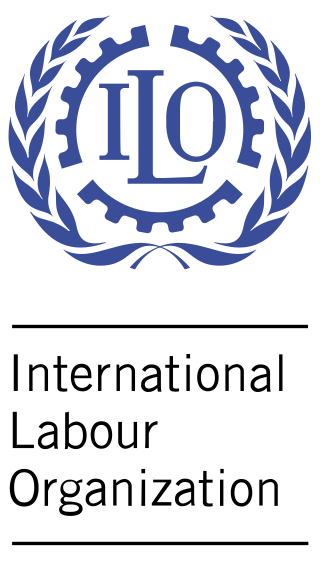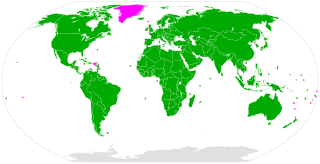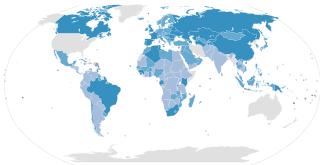
The International Labour Organization (ILO) is a United Nations agency whose mandate is to advance social and economic justice by setting international labour standards. Founded in October 1919 under the League of Nations, it is one of the first and oldest specialized agencies of the UN. The ILO has 187 member states: 186 out of 193 UN member states plus the Cook Islands. It is headquartered in Geneva, Switzerland, with around 40 field offices around the world, and employs some 3,381 staff across 107 nations, of whom 1,698 work in technical cooperation programmes and projects.
Labour laws, labour code or employment laws are those that mediate the relationship between workers, employing entities, trade unions, and the government. Collective labour law relates to the tripartite relationship between employee, employer, and union.
Labor rights or workers' rights are both legal rights and human rights relating to labor relations between workers and employers. These rights are codified in national and international labor and employment law. In general, these rights influence working conditions in the relations of employment. One of the most prominent is the right to freedom of association, otherwise known as the right to organize. Workers organized in trade unions exercise the right to collective bargaining to improve working conditions.

The Convention Concerning the Prohibition and Immediate Action for the Elimination of the Worst Forms of Child Labour, known in short as the Worst Forms of Child Labour Convention, was adopted by the International Labour Organization (ILO) in 1999 as ILO Convention No 182. It is one of eight ILO fundamental conventions.

Anti-discrimination law or non-discrimination law refers to legislation designed to prevent discrimination against particular groups of people; these groups are often referred to as protected groups or protected classes. Anti-discrimination laws vary by jurisdiction with regard to the types of discrimination that are prohibited, and also the groups that are protected by that legislation. Commonly, these types of legislation are designed to prevent discrimination in employment, housing, education, and other areas of social life, such as public accommodations. Anti-discrimination law may include protections for groups based on sex, age, race, ethnicity, nationality, disability, mental illness or ability, sexual orientation, gender, gender identity/expression, sex characteristics, religion, creed, or individual political opinions.

The ILO Convention Concerning Minimum Age for Admission to Employment C138, is a convention adopted in 1973 by the International Labour Organization. It requires ratifying states to pursue a national policy designed to ensure the effective abolition of child labour and to raise progressively the minimum age for admission to employment or work. It is one of eight ILO fundamental conventions. Convention C138 replaces several similar ILO conventions in specific fields of labour.

The Forced Labour Convention, the full title of which is the Convention Concerning Forced or Compulsory Labour, 1930 (No.29), is one of eight ILO fundamental conventions of the International Labour Organization. Its object and purpose is to suppress the use of forced labour in all its forms irrespective of the nature of the work or the sector of activity in which it may be performed. The Convention defines forced labour as "all work or service which is exacted from any person under the menace of any penalty and for which the said person has not offered himself voluntarily", with few exceptions like compulsory military service.
The Freedom of Association and Protection of the Right to Organise Convention (1948) No 87 is an International Labour Organization Convention, and one of eight conventions that form the core of international labour law, as interpreted by the Declaration on Fundamental Principles and Rights at Work.
The Right to Organise and Collective Bargaining Convention (1949) No 98 is an International Labour Organization Convention. It is one of eight ILO fundamental conventions.
Maternity Protection Convention, 2000 is an International Labour Organization Convention.
The Convention concerning Equal Remuneration for Men and Women Workers for Work of Equal Value, or Equal Remuneration Convention is the 100th International Labour Organization Convention and the principal one aimed at equal remuneration for work of equal value for men and women. States parties may accomplish this through legislation, introduction of a system for wage determination and/or collective bargaining agreements. It is one of 8 ILO fundamental conventions.

Abolition of Forced Labour Convention, 1957, the full title of which is Convention concerning the Abolition of Forced Labour, 1957, is one of the eight ILO fundamental conventions of the International Labour Organization, which cancels certain forms of forced labour still allowed under the Forced Labour Convention of 1930, such as punishment for strikes and as a punishment for holding certain political views.
Workers with Family Responsibilities Convention, 1981 is an International Labour Organization Convention.

The Maritime Labour Convention (MLC) is an International Labour Organization (ILO) convention, number 186, established in 2006 as the fourth pillar of international maritime law and embodies "all up-to-date standards of existing international maritime labour Conventions and Recommendations, as well as the fundamental principles to be found in other international labour Conventions". The other pillars are the SOLAS, STCW and MARPOL. The treaties applies to all ships entering the harbours of parties to the treaty (port states), as well as to all ships flying the flag of state party (flag states, as of 2021: over 97 per cent).

The Convention on Domestic Workers, formally the Convention concerning Decent Work for Domestic Workers is a convention setting labour standards for domestic workers. It is the 189th ILO convention and was adopted during the 100th session of the International Labour Organization, in 16 June 2011. It entered into force on 5 September 2013.
The Declaration on Fundamental Principles and Rights at Work was adopted in 1998, at the 86th International Labour Conference and amended at the 110th Session (2022). It is a statement made by the International Labour Organization "that all Members, even if they have not ratified the Conventions in question, have an obligation arising from the very fact of membership in the Organization to respect, to promote and to realize, in good faith and in accordance with the Constitution, the principles concerning the fundamental rights which are the subject of those Conventions".
International labour law is the body of rules spanning public and private international law which concern the rights and duties of employees, employers, trade unions and governments in regulating Work and the workplace. The International Labour Organization and the World Trade Organization have been the main international bodies involved in reforming labour markets. The International Monetary Fund and the World Bank have indirectly driven changes in labour policy by demanding structural adjustment conditions for receiving loans or grants. Issues regarding Conflict of laws arise, determined by national courts, when people work in more than one country, and supra-national bodies, particularly in the law of the European Union, have a growing body of rules regarding labour rights.
Labour rights in New Zealand are largely covered by both statute, particularly the Employment Relations Act 2000, and common law. The Ministry of Business, Innovation and Employment carries out most of the day to day administrative functions surrounding labour rights and their practical application in the state.
The gender pay gap in New Zealand is the difference in the median hourly wages of men and women in New Zealand. In 2020 the gender pay gap is 9.5%. It is an economic indicator used to measure pay equality. The gender pay gap is an official statistic published annually by Stats NZ sourced from the Household Labour Force Survey.
 Brunei
Brunei  Cook Islands
Cook Islands  Japan
Japan  Malaysia
Malaysia  Marshall Islands
Marshall Islands  Myanmar
Myanmar  Oman
Oman  Palau
Palau  Singapore
Singapore  Tonga
Tonga  Tuvalu
Tuvalu  United States
United States 






